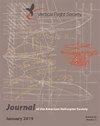UH-60A Airloads Workshop—Setting the Stage for the Rotorcraft CFD/CSD Revolution, Part II: Ongoing Progress, Impact, and Lessons Learned
IF 1.4
4区 工程技术
Q2 ENGINEERING, AEROSPACE
引用次数: 0
Abstract
The UH-60A Airloads Workshop was a unique collaboration of aeromechanics experts from the U.S. Government, industry, and academia to address technical issues that hindered accurate rotor loads predictions. The Airloads Workshop leveraged the NASA/Army UH-60A Airloads flight test and NFAC wind tunnel test data. It functioned continuously for 17 years, from 2001 to 2018, and brought about one of the most important advancements in rotorcraft aeromechanics prediction capabilities by successfully demonstrating high-fidelity coupled computational fluid dynamics (CFD) and computational structural dynamics (CSD) analyses for both steady and maneuvering flight. The article is divided into two parts. Part I surveys the background of rotorcraft CFD/CSD development difficulties, the origins of the Airloads Workshop, and the rapid success achieved during the first phase that consisted of eight Workshops. Part II describes ongoing development during the subsequent two phases of the Airloads Workshop, the Ninth through the 13th, and the 14th through the 31st Workshops. Part II outlines development of CFD/CSD methods to predict rotor airloads for the challenging maneuvering flight condition and also describes the impact of the newly developed CFD/CSD methods and how they were transferred to the larger technical community, opening the door for practical application of CFD methods for designing future advanced rotorcraft. Part II concludes with a discussion of why the Airloads Workshop succeeded and lessons learned from the collaborative effort.UH-60A空运研讨会-为旋翼机CFD/CSD革命设置舞台,第二部分:正在进行的进展,影响和经验教训
UH-60A空气载荷研讨会是美国政府、工业界和学术界航空力学专家的独特合作,旨在解决阻碍准确预测转子载荷的技术问题。航空载荷讲习班利用了美国航空航天局/陆军UH-60A航空载荷飞行测试和NFAC风洞测试数据。从2001年到2018年,它连续运行了17年,成功地展示了用于稳定飞行和机动飞行的高保真耦合计算流体动力学(CFD)和计算结构动力学(CSD)分析,为旋翼飞机的航空力学预测能力带来了最重要的进步之一。这篇文章分为两个部分。第一部分概述了旋翼飞机CFD/CSD开发困难的背景、空气载荷研讨会的起源,以及在由八个研讨会组成的第一阶段取得的快速成功。第二部分描述了空运车间随后两个阶段的持续发展,即第九个到第十三个以及第十四个到第三十一个车间。第二部分概述了CFD/CSD方法的发展,以预测具有挑战性的机动飞行条件下的旋翼空气载荷,还描述了新开发的CFD/CSDs方法的影响,以及它们是如何转移到更大的技术界的,为CFD方法在设计未来先进旋翼机方面的实际应用打开了大门。第二部分最后讨论了Airloads Workshop成功的原因以及从合作中吸取的经验教训。
本文章由计算机程序翻译,如有差异,请以英文原文为准。
求助全文
约1分钟内获得全文
求助全文
来源期刊

Journal of the American Helicopter Society
工程技术-工程:宇航
CiteScore
4.10
自引率
33.30%
发文量
36
审稿时长
>12 weeks
期刊介绍:
The Journal of the American Helicopter Society is a peer-reviewed technical journal published quarterly (January, April, July and October) by AHS — The Vertical Flight Society. It is the world''s only scientific journal dedicated to vertical flight technology and is available in print and online.
The Journal publishes original technical papers dealing with theory and practice of vertical flight. The Journal seeks to foster the exchange of significant new ideas and information about helicopters and V/STOL aircraft. The scope of the Journal covers the full range of research, analysis, design, manufacturing, test, operations, and support. A constantly growing list of specialty areas is included within that scope. These range from the classical specialties like aerodynamic, dynamics and structures to more recent priorities such as acoustics, materials and signature reduction and to operational issues such as design criteria, safety and reliability. (Note: semi- and nontechnical articles of more general interest reporting current events or experiences should be sent to the VFS magazine
 求助内容:
求助内容: 应助结果提醒方式:
应助结果提醒方式:


